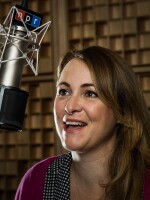Sami al-Maghrabi used to have a pretty boring job. For years he would sit in his shop in Jordan, near the border with Syria, waiting for smugglers to buy stuff like tea and rice — stuff that's cheap in Jordan but would turn a profit back in Syria.
Then the Syrian uprising started in Daraa, a city just a few miles away across the border. Followed by the government crackdown.
Many people have been killed in the southern Syrian city. For a time, Daraa was cut off from the rest of the country, and it became a rallying cry for the Syrian protesters.
Maghrabi's shop became a kind of word-of-mouth news bureau for what little information was coming out of Syria.
Maghrabi says everyone on this side of the border has a relative in Daraa, which means everyone here has suffered. Families have lost brothers and sons, and children have lost their fathers, he says.
Maghrabi says no one expected Daraa to be the seat of revolt in Syria. But now that so many have died, he says the people will not stay quiet.
A Historical Context
A quiet, windswept road nearby runs along a historic ancient trade route that starts in Yemen and goes all the way up to Damascus. Lawrence of Arabia even passed through Daraa — he claimed that he was sexually assaulted by Turkish officers back during the Ottoman times.
That was during the World War I. The Ottomans eventually lost, and the English and French cut the region into separate countries — including Iraq, Lebanon and Syria.
A few years later, Arabs rose up against their colonial rulers. Syrian peasants just east of Daraa launched what is now known as the Great Arab Revolt, against the French, in 1925.
History professor Michael Provence, who wrote a book about that revolt, says that once Syria shook off its colonial yoke and the socialist, Arab-nationalist Baath Party took over, Daraa and the surrounding region actually prospered.
"The Syrian government invested a lot of money in the countryside," Provence says. "They made sure that the villages were electrified, that they had telephone service, that they had reasonably good clean water and health care and schools."
That all changed when longtime Syrian ruler Hafez al-Assad died, and his son Bashar took over and began dismantling the caretaker state in the name of economic reform.
"What that means is that some people have gotten enormously wealthy — mostly people who are close to the centers of power — and lots of other people have become a lot less prosperous than they used to be," Provence says.
Add to that a drought over the past two years, Provence says, and it's no wonder Daraa and other rural areas have erupted in protest
Traumatic Events In Daraa
Back at Maghrabi's shop, a driver from Daraa walks in the door. He doesn't want to give his name. He says his cousin was killed right before his eyes, by a sniper shot to the heart.
Now, the driver says he and his friends in Daraa are fighting back. He says they corner army soldiers in dark alleys and steal their guns. Sometimes, he says, the soldiers make it clear they sympathize with the protesters.
One of his friends recently was face to face with an army soldier. The friend looked at the soldier, the driver says, and said, "What can we do for you?" And then, the driver continues, the soldier left his weapons and said, "You can kill me. Kill us all."
It's incidents like these that lead analysts in the region to predict that Daraa is poised to become something more like Benghazi — the stronghold of the armed rebellion in Libya — as opposed to the relatively peaceful protest scene in Egypt's Tahrir Square.
As the first Daraa driver leaves the shop, another one comes in. Three of his sons were detained in the crackdown. He knows where one of them is being held. The other two are just missing.
Up until now, the second driver says, he stayed in his house. But this Friday, he says, his wife, his youngest son and he are going to the streets to protest.
And if that doesn't work, he says, we'll see.
Copyright 2023 NPR. To see more, visit https://www.npr.org. 9(MDAzMjM2NDYzMDEyMzc1Njk5NjAxNzY3OQ001))


![Jordanians gather near the closed gate of a border crossing between Jordan and Syria, about 2 miles from the Syrian city of Daraa. In his speech on the Mideast Thursday, President Obama said, "the Syrian government must stop shooting demonstrators and allow peaceful protests ... [and] allow human-rights monitors to have access to cities like Daraa."](https://cdn.kpbs.org/dims4/default/4abf1ef/2147483647/strip/true/crop/968x596+16+0/resize/880x542!/quality/90/?url=https%3A%2F%2Fmedia.npr.org%2Fassets%2Fimg%2F2011%2F05%2F19%2Fgettydigial_custom-44fb589008a6d3b5b0b37c5ab07f16433ae0cb67.jpg)




